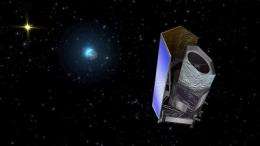Euclid mission gets go-ahead to probe Universe's darkest secrets

The first-ever mission dedicated to looking for dark matter and dark energy, two mysterious entities believed to explain the composition of the universe as we know it, will be launched in 2020, the European Space Agency said Wednesday.
The 800-million-euro ($1-billion) Euclid project was given the final go-ahead by the agency's science programme committee, a body composed of ESA member states that decides which missions are flown.
"We're one step closer to learning more about the Universe's darkest secrets," said Rene Laureijs, Euclid project scientist.
The satellite will use a 1.2-metre (four-foot) diameter telescope and special cameras to map a third of the known universe, a 3D reconstruction of up to two billion galaxies and dark matter associated with them, the agency said in a statement.
"Euclid is optimised to answer one of the most important questions in modern cosmology: why is the Universe expanding at an accelerating rate rather than slowing down due to the gravitational attraction of all the matter in it?"
Dark energy is a term used to explain the accelerating expansion of the universe, while dark matter is what is believed to hold it all together, exerting a gravitational force.
Dark matter is believed to comprise 83 percent of matter in the Universe, but it cannot be detected by the naked eye or by existing astronomical techniques.
More information: Press release
(c) 2012 AFP


















